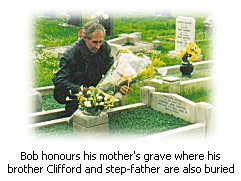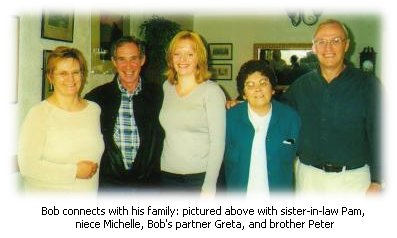A Seven Year Search
This story is provided by Bob (Robert) Barnes - an ex-Bindoon resident - who started looking for his family of origin in 1990. Seven years later, around Christmas 1997, he got his first breakthrough. The Child Migrant Trust had matched his mother's signature on two documents. Bob returned to England to meet up with his family earlier this year. This is his story.
Bob (Robert) Barnes was born in 1935, in Kensington, a district right in the heart of London. By the age of three or four he as living in a Sisters of Mercy home in Bodmin, Cornwall.
Bob remembers the nuns who looked after him with much affection. They always treated him "fairly," he says. At Bodmin he was nick-named "Irish Bob" and led to believe that he came from County Cork in Eire. It came as quite a shock to find that he was in truth a "Londoner" - very much an Englishman!
At age 11, Bob was told that he was one of six from the home in Bodmin who should count themselves "lucky to be going to Australia". Bob in fact didn't feel lucky at all, since he was content living with the nuns and had been doing very well with his school work.
No one had sought his view on the matter!
Bob came to Western Australia on the Asturias in 1947. He went straight to Bindoon where he was resident until 1952.
Happy experiences for Bob at Bindoon were few and far between and he regrets, in particular, that his education ceased abruptly on his arrival. This meant that through his life he has always had to work with his "brawn" rather than with the "brain".
Bob's love of horses provided some compensation. At Bindoon, he especially loved working with the big draught horses.
He learned there that horses will do anything you ask of them provided, he says, "you work with and not against their natures."
He later worked for five years as a "horse-breaker" up North but had to give it up after he broke both his knees! In more recent times Bob has worked as a truck driver.
Contact with C-BERSS
Bob got in touch with C-BERSS in January of 1995. The Child Migrant Trust had been searching for his family of origin since 1990. Progress in tracing seemed mighty slow to Bob. Of course, having a common name like "Barnes" was proving no help! In 1995 the Trust found 23 individuals all with the same name as his mother - "Hilda Barnes"!
Bob often despaired of success and admits to a growing sense of cynicism that his family would ever be located. But then, at Christmas 1997, the CMT had a breakthrough. They found a match between his mother's signature on his birth certificate and that on her marriage certificate to a Mr Dugdale. The couple had been living their life in Nottingham, which was very ironic, since Nottingham is the home base of the Child Migrant Trust!
Bob learned that his mother, who was from Eire, had been a seamstress working in London. Four years after Bob was born, in 1939 she had married Mr Dugdale. Together the couple had three sons - Clifford, David and Peter. Clifford had drowned when he was 19. Bob's mother had died in 1986 and Mr Dugdale in 1992, but David and Peter were alive and well.
Once contact was initiated, a warm correspondence began with Bob's "new" family. The brothers had had "no inkling" of Bob's existence although they said they had sensed that their mother's grief when Clifford died was like she was grieving once again. She was never forthcoming about her own origins and they knew little of her early years in Eire.
 Bob returned to England in May and June of this year for his first visit since setting out from its shores in 1947. He was accompanied by his long-time partner, Greta. He met up and stayed with David and Peter and their families. His brothers made him feel extremely welcome. Bob returned to England in May and June of this year for his first visit since setting out from its shores in 1947. He was accompanied by his long-time partner, Greta. He met up and stayed with David and Peter and their families. His brothers made him feel extremely welcome.
Bob is pleased, without being jealous, of the successful lives of his new-found family. David (aged 52) is a helicopter engineer, married to Marion, who is from Greece. They have children, Louise (28), Julie (26) and Michael (22). Peter (aged 50) is governor of a psychiatric prison. He is married to Pam, with two sets of twins, Martin and Tina (23) and Ceri and Michelle (19). Bob is proud of the fact that all of his nieces and nephews are university graduates or presently undertaking studies at university.
Very understandably, he sometimes wonders what he too might have achieved in life if only educational opportunity had been open to him in Western Australia.
A sense of belonging
Bob liked England a lot. He speaks of the beauty of the Cotswolds in particular. He loves the friendliness of the old English pubs! But he was even more impressed and warmed with the wonderful reception he experienced from his brothers, his nieces and his nephews.
Bob says that this reunification has given him "a sense of belonging" and "a feeling of indentity" that he has never enjoyed before.

Though it proved a long while between beginning the search for his family and at last getting to meet them, Bob is sure that it has been well worth the wait in the end.
Bob is continuing to maintain regular contact with his new-found family of origin with cards and frequent telephone conversations. He wishes to add his thanks and appreciation to all the C-BERSS staff for making his reunification trip possible and for all the invaluable counselling help he has received over the years from the agency.

|



